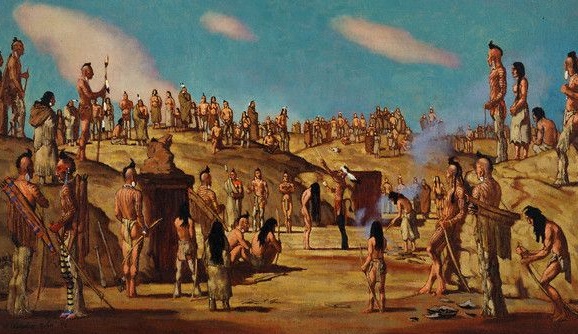
The county and city of Pawnee, Oklahoma are home to the Pawnee (Chahiksichahiks) tribe. Over the course of the 19th century, the tribe declined in numbers from over 10,000 to approximately 4,000 people living on lands along the North Platte river in Nebraska and Kansas. By the 1870s, despite a long history of military service with the United States, the Pawnee were forcibly restricted to a reservation in present-day Nance-county, Nebraska. In 1874, after inhabiting the great plains for centuries, several hundred members of the Pawnee tribe requested relocation to Indian Territory (what became the state of Oklahoma in 1906). The tribe settled residual claims arising from the illegal taking of its lands in Nebraska and Kansas by agents of the United States in the 1960s.
On September 3, 2016 a magnitude 5.8 earthquake hit Pawnee, Oklahoma. The earthquake damaged several buildings owned by the tribe, including the main administrative building:
“These buildings were built almost 100 years ago and they’re sturdy as heck and ready to withstand everything Oklahoma could throw at them – except for earthquakes,” tribal member Andrew Knife Chief told News on 6.
Companies operating several wells in the Osage Nation agreed to shut down drilling and hydraulic fracturing after the earthquake. Oklahoma declared a state of emergency. Revenues from oil leases are an important source of support for members of the Osage Nation who each receive several thousand dollars a year from the mineral rights council.
The Pawnee tribe sued the Bureau of Indian Affairs and the Bureau of Land Management two months later, alleging they had improperly granted oil drilling permits despite an agreement reached in 2015 with the tribe to establish a moratorium.
Then on Thursday, the Pawnee tribe filed a civil lawsuit in tribal court against several oil companies alleging disregard for earthquakes caused by their activities.
The case will be heard in the tribe’s district court with a jury composed of Pawnee Nation members.
“We are a sovereign nation and we have the rule of law here,” said Andrew Knife Chief, the Pawnee Nation’s executive director. “We’re using our tribal laws, our tribal processes to hold these guys accountable.” […]
Curt Marshall, one of the attorneys representing the Pawnee Nation, said the lawsuit was filed in tribal court primarily so that the Pawnee Nation could assert its sovereignty.
“The tribe has jurisdiction over civil matters to enforce judgments within its jurisdiction, including judgments over non-Indians,” Marshall said.
— ABC News
Any verdict reached by the jury can be appealed to five-member tribal supreme court. The tribal Supreme Court’s verdict is final and cannot be appealed. The judgement would be enforced by any district court in Oklahoma.
“We understand the industry is very important to the economy of Oklahoma, and the last thing we want to do is come in and shut the operations down,” said Marshall, the tribe’s attorney. “But we do want the oil and gas industry to act responsibly environmentally, and we want them to be held accountable for the damage they’ve created.” — NY Times



Leave a Reply